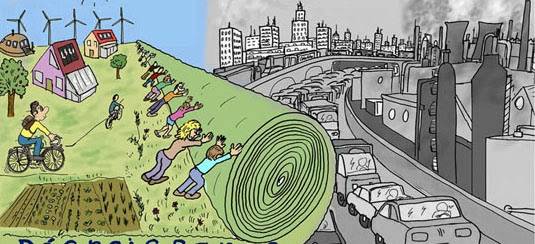Why is the concept of "growth" still so widely accepted?
- On 15, 16 and 17 May, a conference in the European Parliament entitled “Beyond Growth” questioned the importance and meaning of growth, considering inadequate indicators such as Gross Domestic Product. However, the disaster is far from being taken into account in our institutions, and in half a century this concept has been very satisfactory. What would the proponents of extinction need to change this?

There can be no unlimited growth in a limited world," is the main message of slowdown, since it was theorized in a more structured way in the 1970s. For our productive system and lifestyles to be sustainable, it is necessary to reduce the exploitation of natural resources and damage to the environment to reach sustainability levels. Deceleration has two main sources: modelers and theorists of political ecology. We could include it in the first block in Nicholas Georgescu-Roeg, with The Entropy Law and the Economic Process, published in 1971, or with Dennis Meadows, the lead author of the report "Frontiers of Growth", promoted by the Club of Rome in 1972. The criteria of this line are based on physical limits, from which the choices at global level in terms of forms of production are deducted, without great social development.
The whole of political ecology is more diverse and politically analyzes the problem beyond its quantitative analysis. Philosophers Simone Weil, Hannah Arendt and Günther Anders addressed the issue, although they did not talk about decadence itself: in the context of the acceleration of industrial development, they questioned the meaning of work and production, as not only in the environment but also in the human being and in society. In addition, André Gorz, Jacques Ellul, Ivan Illich or Tim Jackson are some of the most cited names in this second line of decline. Despite the development of different thoughts, a society centered on the messiah has a common goal. They say that human dignity and freedom are in the autonomy to define needs and respond to needs rather than wealth.
Our freedom is worth considering the physical limitations of the planet, the complexity of ecosystems, the complementary human fragility and the demands of cooperation.
Taboo growth, but possible green growth?
Decadence began to theorize more deeply in the 1970s, and half a century later it is clear that it has not been very successful. As Antonio Turiel says in the interview given in number 2825 of ARGIA, the word remains taboo. Following the issuance of the report "The Limits of Growth", the authors were charged with Malthusianists, i.e. supporters of population reduction. Although this criticism was in bad faith, because they advised that the population did not suffer drastic cuts, it should be acknowledged that the variability in the level of consumption was not taken into account in their models, so the effect of the cracked wealth did not appear in the depletion of resources, nor did in the case of pollution there appear asymmetries of wealth. In other words, the social dimension was insufficient in that work.
However, the thinkers of the slowdown that placed the social dimension at the centre have always been marginal, utopians that have not been taken seriously from the point of view of the dominant economic model. Debt and interest can be one of the main causes of a taboo decline, which forces growth, as economic crises otherwise occur. This creates another major problem: that globally the Gross Domestic Product (GDP) is closely related in practice to the use of fossil fuels. Growth therefore aggravates climate change.
.jpg)
Over the past three decades, "sustainable development" has been called for in several UN exercises, and in recent years there has been talk of "green growth" in the decoupling of GDP from the use of fossil fuels. Although this decoupling occurs in certain sectors, according to Carbone 4, it must comply with five standards to respond to the climate emergency: it must be "absolute" – GDP and environmental collateral damage must go in opposite directions – "total" – GDP must be decoupled from all greenhouse gas emissions – "worldwide", "sustainable" and "downwards". The veracity of the hypotheses to fulfill all these obligations is very doubtful according to Carbone 4. It is therefore not so clear what is the most utopian: degrowth or green growth.
The principal theorists of deceleration affirm that the dignity and freedom of the human being resides in the autonomy to determine needs and respond to needs rather than in wealth
Changing economic models, avoiding recoveries
In addition to carbon accounts, the GDP of a state is used to set fiscal levels and determine the different budgets of the state (education, health, culture...). To date, no other form has been found, even if there are structured proposals. Tim Jackson presents in 2007 his "green macroeconomics" proposal in his book Prosperity Without Growth: Economics for a Finite Planet ("Prosperity without growth: Ekononia for a Limited Planet"). The latter has three main axes: to change the objectives of the company, to maximize the benefits to services useful for the "ability to live well" of society; to redirect investment towards future prosperity; and to enable the investments society needs, to change the sovereignty of the generation of money so that it does not fall exclusively on private banks.
.jpg)
The criticism of bad faith, in addition to the hegemonic economic model and the hypothetical green growth, now has another enemy: the risk of recovering the right extremes. It is striking that French theorist Alain De Benoist wrote in 2007 a book on deceleration. It is not an isolated fact, but one of the pillars of a movement that is underpinning, according to researcher Antoine Dubiau (see Evil that recovers fascism and analyzes ecology with a fascist approach, ARGIA 2783).
In order to combat ecofeminism, Dubiau believes that a socialist vision of slowdown must be reverted. Researcher Geneviève Azam underlines that talking about nature is not about betting on social Darwinism, but that our freedom is worth considering the physical limitations of the planet, the complexity of ecosystems guaranteed by societies, the complementary human fragility and the demands of cooperation.
On 3 September the Official Bulletin of Navarre published the announcement by the Government of Navarre announcing the update of the Navarre Energy Plan. This should be an important step for the future of our community, taking into account the importance of energy and its use... [+]
We have had several crises in recent years. Firstly, the economic crisis that had devastating and global effects in 2008, of which we have not yet recovered 15 years later. Then came a crisis as a result of a serious global pandemic and, finally, we are in a new crisis of prices... [+]
In the short term, humanity has at least two major existential problems -- atomic war, half forgotten, but -- and climate change. The first would be fast and the other would be slower in the face of our lives, but very fast in view of the history of humanity.
It is undeniable... [+]
Antonio Turiel (Leon, Espainia, 1970) ingeniaria itzal handiko aditua da energia-krisia, iraunkortasuna eta desazkundeari lotutako gaietan (ARGIAk 2015ean elkarrizketatu zuen). Berrikitan bere The Oil Crash blogean argitaratu du urtarrilaren 15ean a Vall d'en Bas (Katalunia)... [+]
In these times of impoverishment, it is a mockery that the Provincial Council of Bizkaia wishes to spend more than EUR 400 million on the construction of the subfluvial tunnel. Moreover, looking at the economic and technical dimensions of the infrastructure, who can assure us... [+]
The Economic Development Advisor of the Government of Navarra, Manuel Ayerdi Olaizola, has just published in several Navarros newspapers the opinion article "Reducing the temperature of the planet is a priority". In it, it tells us about the unsustainability of our community's... [+]
It seems that behind the coronavirus pandemic there is a loss of biodiversity in many areas of the world. Whole ecosystems disappear to accommodate the crops and companies that the capitalist system needs. In the absence of plant and animal diversity, diseases affecting wildlife... [+]






















